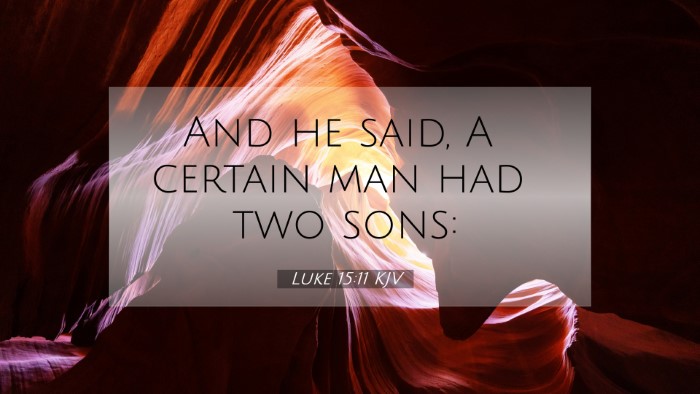Understanding Luke 15:11
Luke 15:11 narrates the parable of the prodigal son, a poignant story that conveys deep spiritual truths about forgiveness, repentance, and the unconditional love of God. The verse states:
"And he said, A certain man had two sons." This introduction not only sets the stage for the narrative but also symbolizes the relationship between God and humanity, as depicted through the character of the father.
Exegesis and Meaning
The parable begins with the mention of the father and his two sons, indicating the familial relationship that will become central to the story. Biblical scholars such as Matthew Henry emphasize the father's role as a figure of God, illustrating divine love and mercy that is extended to all, regardless of their status or choices. The younger son represents the lost, who chooses a path away from the traditional values of family and faith.
Albert Barnes adds that the father’s willingness to receive the son back after he squandered his inheritance exemplifies the concept of redemption. As seen throughout scripture, particularly in Isaiah 55:7, the call for the wicked to return is a recurrent theme, emphasizing that repentance is always welcome.
Meanwhile, Adam Clarke explains that the act of asking for his inheritance while the father was still alive was a significant cultural affront, a gesture that demonstrates the son’s rebellion and desire for independence. This cultural context allows the audience to fully understand the depth of the son’s estrangement from the family.
Parallels and Cross-References
Luke 15:11 connects profoundly to several other Biblical texts, enhancing our understanding of its themes:
- Matthew 18:12-14 - The Lost Sheep: Illustrated the joy of recovering that which is lost.
- John 3:16 - God's love for the world, indicating the extent of divine compassion.
- Isaiah 1:18 - A call to repentance with the assurance of forgiveness.
- Romans 5:8 - Suggests that Christ died for the ungodly, echoing the father's love for the prodigal son.
- Ephesians 2:4-5 - God's mercy and grace that offer salvation to the lost.
- 1 John 1:9 - The promise of forgiveness for those who confess their sins.
- 2 Corinthians 5:17 - Discussing the new creation that comes from returning to God.
Thematic Connections
The themes presented in Luke 15:11 are also echoed throughout the Scriptures, highlighting the interconnectedness of God's message:
- Forgiveness: Seen in Matthew 6:14-15, which emphasizes the need to forgive others as God forgives us.
- Repentance: Both John the Baptist in Matthew 3:2 and Jesus in Mark 1:15 preaches the significance of turning back to God for the kingdom's sake.
- Grace: Acts 15:11 reveals how grace saves, reiterating that salvation is unearned.
Application for Today
The implications of Luke 15:11 are vast for believers today. It serves as a reminder of God's unwavering love, available to all who repent, echoing the sentiment found in Hebrews 4:16. The invitation to return home resonates deeply, especially in a world that often seems to stray from spiritual truths. Believers are encouraged to extend this same love and forgiveness to others, forming a cycle of grace akin to that of the father to the son.
Conclusion
In conclusion, Luke 15:11 sets off a significant spiritual discourse, advocating themes of love, forgiveness, and redemption. By utilizing various Bible verse cross-references and exploring the connections between Bible verses, believers can deepen their understanding of God's character. Engaging with this parable invites one to reflect on their journey and relationship with God, welcoming the lost home once more.



